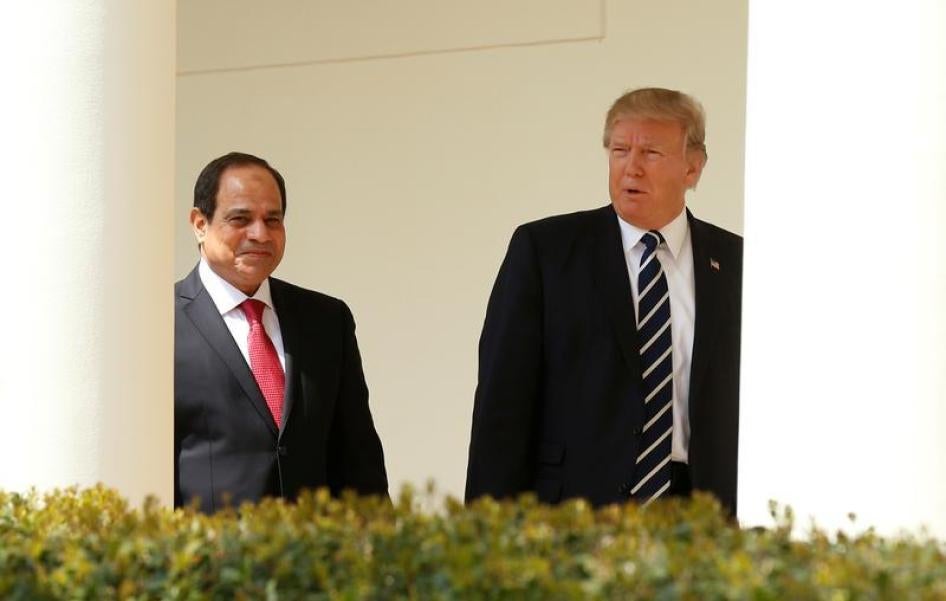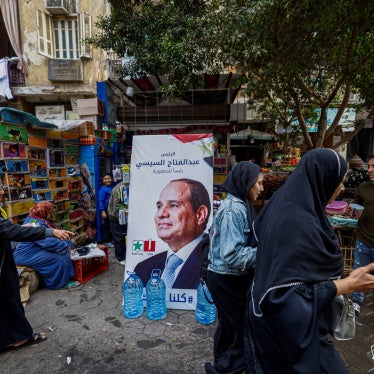This is the state of human rights in Egypt under President Abdel Fattah al-Sisi, who is due to meet President Trump at the White House on Monday.
Weeks after overthrowing Egypt's first democratically elected president, Mohamed Morsi, in July 2013, Sisi's security forces stormed pro-Morsi protest camps in Cairo, killing at least 817 people in one day, the worst peacetime massacre of Egypt's modern history.
Since then, the right to protest has all but vanished in Egypt. Police routinely suppress anti-government demonstrations with violence.
The authorities have imprisoned tens of thousands of political opponents of Sisi's government, often in appalling conditions, with lack of access to medical care that in some cases has led to death.
Police and National Security agents routinely use torture and enforced disappearances against criminal suspects and political opponents alike with near impunity.
In North Sinai, the military commits egregious abuses including extrajudicial executions and unjustified home demolitions in its fight with the local franchise of the extremist group the Islamic State in Iraq and Syria (ISIS).
Prosecutions, travel bans and asset freezes against human rights defenders as well as repressive new legislation threaten to erase independent civil society and dissent. The authorities deny workers the right to organize and aggressively prosecute those who participate in strikes.
This is terrible, not just for the tens of thousands of Egyptians on the receiving end of governmental abuse. Contrary to the justifications and pretexts of apologists for Egypt's government, it's also bad for stability and progress in Egypt.
Rulers in Egypt have a long history of using the threat of Islamist radicalism to justify cracking down on political opposition and avoiding democratic reform. For decades, successive U.S. administrations have bought this line, supporting the authoritarian government of Hosni Mubarak, the former president, to the tune of billions of dollars in military and development aid.
Egypt's 2011 uprising and its chaotic aftermath, as well as the experience of other Arab countries, shows that this strategy of near-unconditional support for the Arab world's authoritarians has well passed its sell-by date.
Egypt should not be allowed to fail, as Libya, Yemen, Iraq and Syria have done. But fail it may well do if Sisi continues to double down on abuse and authoritarianism. Who knows what a failed state in Egypt would look like, but it's not worth taking the risk to find out.
Trump does not pretend to be a champion of human rights, and he has called Sisi a "fantastic guy." But here's how Trump can do something that is both good for U.S. interests and good for human rights.
Trump should tell Sisi that if he wants the continued support of the U.S. government, he needs to implement a program of genuine political reform, end torture, release political prisoners, relax the restrictions on civil society, end the harassment of human rights defenders and adhere to international standards in his fight against ISIS in the Sinai.
Of course, the chances of Trump doing anything of the kind are vanishingly slim, but still, it's worth making the point that putting America first is by no means incompatible with respect for human rights.
This is not about state-building or spreading democracy, objectives that Trump has clearly stated he believes are not in U.S. interests. Nor is it about pandering to Islamist radicals: Experience suggests that repression in Egypt breeds, rather than eradicates, extremism.
What this is about is preventing the collapse of the Arab world's most populous state (with all the bad consequences that would bring for Egypt, for the region and beyond), and ensuring that U.S. taxpayers do not underwrite a strategy that is discredited in practice and wrong in principle.










